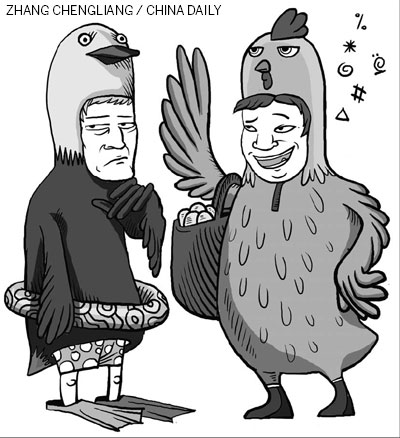Voices
Foreigners confused by a chicken talking to a duck
By Haihua Zhang and Geoff Baker (China Daily)
Updated: 2010-07-02 10:01
 |
Large Medium Small |

I recently went with two close foreign friends - a world-renowned author and a well-known Western intellectual who focuses on China - to Chengdu, a beautiful inland city in Southwest China with 13 million people. The purpose of the trip was to look at the unique urbanization model that the local government has been developing for the last seven years.
What touched me most was how open and friendly the local people were. We were professionally received with a broad itinerary, showcasing Chengdu, from its rural development to well thought-out urban initiatives that aim at harmonious development, balancing the ever-increasing wealth gap. Even though it was a rushed trip, every person we met left such a wonderful impression, from the beautiful 32-year-old Party secretary of a tranquil little town to a 76-year-old farmer who now lives in his new villa the local government built after the 2008 earthquake. One could feel their genuine contentment and appreciation of life.
However what I would like to explore here is the intriguing way Chinese people communicated with us and how sometimes "Chinese talk" can completely baffle foreigners. As a "sea turtle" (a common Chinese term for Chinese people who go overseas for many years but eventually return to China) I grew up learning "politics" at school and had no trouble with terms like "Three focuses", "Four in one development". But my expatriate friends were totally confused and lost. When our translator mentioned "developing a global idyllic metropolis" they could not help rolling their eyes.
Over the years living and working in China I have often encountered similar communication challenges between Chinese people and foreigners. Sometimes I think to really learn to talk like a Chinese person requires being born and brought up here.
China is one of the world's most ancient cultures and Chinese people communicate in unique, complex and often seemingly bizarre ways. In Chinese a person can speak two types of languages, one "formal" (which is indirect and respectful) and one "informal" (which is more direct and open). The latter is often used when he or she is at home, with close friends or at places where the person feels safe and trusted. Under these circumstances people usually let their guard down and can speak quite frankly.
But when there is a formal occasion another type of language will be put to use. Often people will speak as little, or as vaguely as possible when asked for a definite opinion or feedback, even more so if they are not the most senior people present. If the occasion calls for speech, they often talk in taohua and konghua -both mean superficial meaningless "weather talk", "big talk", dahua-exaggerated statements, or even jiahua - false statements.
There is also a special category called guanhua - official language. Much of the formal meetings my friends and I attended during this trip required the Chinese attendees to speak such language. For many years China did not have much need to communicate with the rest of the world about its policies and thinking. The government's only task was to promote certain thoughts and ideas to its people.
To make sure that complicated messages were effectively delivered all the way from the top to the local level, one thing that officials developed was the use of "numbered" policies, like the "three represents" and "four focuses". Over the years, both the government and Chinese people have become familiar with this language, although most foreigners do not have a clue how to keep up with or make sense of such Chinese acronyms and jargon.
Unfortunately if you don't have a competent interpreter, or don't know how to ask the right questions to get to the bottom of all these "threes, sixes or nines", the situation becomes - as they say in Chinese - "a chicken trying to speak with a duck' jitong yajiang.
How can you avoid this? One critical thing is to choose the most appropriate translator. Remember it is not just words that need to be translated. Conveying Chinese culture and social context is often critical to proper communication. Being bilingual (or multilingual for that matter) does not mean that the translator will understand what is truly being discussed.
The other important part of your preparation is to be properly briefed by local partners or service providers. Being politically correct is critical to your China plans. It is important to truly understand the intentions and policies of government at all levels.
Armed with carefully prepared background information and supported by the right translator, you will find that if you let go of certain Western ways of communication, be open minded and ask the right questions, you can and will eventually figure out what is really being said. You will slowly realize what type of hua - language - Chinese people are speaking. Better still, if you can relate and use similar vocabulary to expand the conversation and direct it according to your objective. Doing so will also show respect to your Chinese counterparts and more importantly give them face - which will help further strengthen the relationship between you and them.
Partly adapted from 'Think Like Chinese', Federation Press 2008, co-authored by Haihua Zhang and Geoff Baker